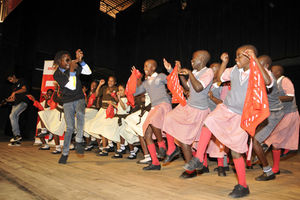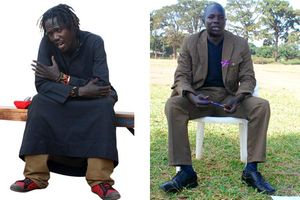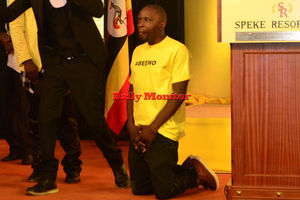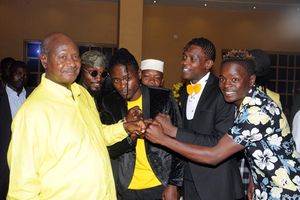
President Museveni and local artistes during a campaign meeting ahead of the February 2016 elections. In 2016, a group of Ugandan musicians led by singer Bebe Cool (Moses Ssali) came together to sing a campaign song for President Museveni. PHOTO/FILE
Musician Priscilla Zawedde, also known as Azawi, has often made use of her social media platforms to speak out against social injustices, particularly corruption. Her constant actions have been applauded by Ugandans, particularly those on the social media site X (formerly Twitter). Azawi’s fans on X frequently interact with her and encourage the musician to continue speaking out for Ugandans.
This past week, as the country’s youth prepared to take part in a march to Parliament, several posts were taken down from Azawi’s X account. This prompted concern among her admirers who speculated that she was compelled to delete the posts by either authorities or the record firm that oversees her music.
While attempting to clarify why she had to remove the posts, Azawi expressed dismay that some people attempted to exploit her comments for their objectives. This, she said, prompted her to remove the post as a precaution.
“I want to clarify that I personally deleted my post because I have full control over my Twitter account,” she said.
Azawi also stated that her choice was not in any way a sign that she had compromised her views or that she had suddenly bowed to those she had frequently reprimanded for mismanaging the country.
“Trust me, I did not do it to please those endangering this country. I can never give such cowards that satisfaction,” she explained.
Speaking to this publication, Azawi shared that besides entertainment, artistes have a duty to create awareness and educate. As the country grapples with corruption, Azawi believes that she must add a voice. She adds that it is very unfortunate that Uganda is a country that is governed by delusional people who are disconnected from what is happening on the ground.
Azawi adds that those who press hard are intimidated at the end of the day as she warns that it is about sacrifice from those who wish the country better.
“Not everyone in this fight is in it for good reasons,” she tells this publication, adding, “Some people are part of this because of their selfish interests, and that alone can deviate us from the original cause.”
A no-show
Azawi believes that those in the music industry should not let people down. They should, she adds, take steps to echo voices of disgruntlement.
“It is very nasty already that some of the artistes are already in the pockets of politicians yet if we join them and amplify their voices, those in power can wake up and prescribe remedies to corruption,” the artiste opines.
In addition, Azawi emphasises that the fight against corruption should never be “violent”. Consequently, she encourages Ugandans to raise their concerns peacefully.
“The fight against corruption should never be violent because the moment it crosses that line, nobody wins. I stand for peaceful protests,” she explains.
Suppressing free speech
Singer Manisul Ssemanda, alias King Saha, like Azawi, has recently spoken out about issues like corruption, abductions, and suppressing free speech that stick out like the proverbial sore thumb.
Saha, who has used his social media platforms as a megaphone, recently announced that he had begun a project to create 100 songs that speak to what people are going through.
He has since released several songs with lyrics that highlight a variety of issues, including living standards, security, quality of education, and corruption, among others.
Yet, despite such enthusiasm, Saha was a no-show on Tuesday when the anti-graft protests took centre stage. Days prior, Saha had claimed that the police tended to disorganise his music performances.
Why the silence
Music legend Daniel Kazibwe, alias Ragga Dee, who is also the chairperson of the National Cultural Forum, notes that it is not fair for the public to blame musicians for not speaking up. This, Ragga Dee adds, is because the musicians are also victims of corruption.
“Musicians are also human beings just like anyone else. I have not heard of the clergy, police officers, Members of Parliament, and others coming forward to join the fight against corruption. Everyone should be blamed,” he explains.
Ragga Dee also shares that he does not encourage musicians to fall for projects that they do not understand, adding that organisers of the anti-corruption march could have ulterior motives.
“Those who are fighting corruption have already shown us that they are working and it is evident that even arrests of ministers and other government officials have already happened before the march to Parliament,” he observes, adding, rhetorically, “What would you want the musicians to prove?”
Ragga Dee further shares that he was shocked that those who walked to Parliament were only holding placards against House Speaker Anita Among yet, in his assessment, many lawmakers are corrupt.
“The message I saw was calling Speaker Anita Among to resign, but the truth is that many MPs are corrupt and that is why they legislate in their own interest. I am yet to see an MP who suggests that their salaries should be reduced,” he says.
‘We will not join NUP’
Moving forward, Ragga Dee believes that it would do all parties a world of good if the consensus was that the fundamental responsibility of musicians in society is to educate and bring hope through music.
Phinah Mugerwa Masanyalaze, the secretary general of the Uganda Musician Association (UMA), says the association is not ready to join any movement organised by the National Unity Platform (NUP) party.
She emphasises that, as President Museveni guided, UMA will be willing to take part in an anti-corruption demo that is legal and organised by government agencies like police.
“Musicians are also affected by corruption and we are against the vice. However, we will not join NUP. We are not partisan,” she explains.
Mugerwa notes that the musicians’ association will soon issue a statement on corruption and also reveal their course of action.
A musician who sought not to be named explains that most Ugandan musicians rely on the patronage of the politicians who fund music concerts, and public security, among other benefits.
“Currently, all musicians groupings are funded by [the] government, independent politicians or Gen Salim Saleh, the President’s brother. I am a beneficiary and the message that we get whenever we get money from them is that we should either support the government or not go against it,” the artiste explains.
In recent years, musicians have frequented State House, the seat of power in the country, as well as Salim Saleh’s abodes in Gulu and Kapeeka.
The outliers
That’s not to say all artistes have opted to put a sock in it. Singer Wycliffe Tugume, alias Ykee Benda, says it is a civic duty for him as a Ugandan to fight for the less fortunate.
“I am against corruption and I will voice my concerns to whoever is involved or suspected to be involved. I do not do it for applause, I do it because it is the right thing,” he says.
Relatedly, singers Apass, alias Bagonza, Bruno K, and a few others have come out to use their social media platforms to speak against corruption and defend freedom of expression.
Over the years, music has been used not just to communicate, connect, educate and inspire people but also to stand up against injustices that include corruption.
Songs such as Zombie by Nigeria’s Fela Kuti, Miriam Makeba’s Ndodemnyama, and Angélique Kidjo’s We We have been used to create social change.
It is reported that in 1972, Congolese Franklin Boukaka was killed, thanks to his song Le Bucheron Africa which was being used as a mobilising tool by an anti-corruption group in a failed coup attempt.
Music legend Daniel Kazibwe, alias Ragga Dee: Musicians are also human beings just like anyone else. I have not heard of the clergy, police officers, Members of Parliament, and others coming forward to join the fight against corruption. Everyone should be blamed.
Phinah Mugerwa Masanyalaze: Musicians are also affected by corruption and we are against the vice. However, we will not join NUP. We are not partisan.
Musician Priscilla Zawedde, also known as Azawi: The fight against corruption should never be violent because the moment it crosses that line, nobody wins. I stand for peaceful protests.




